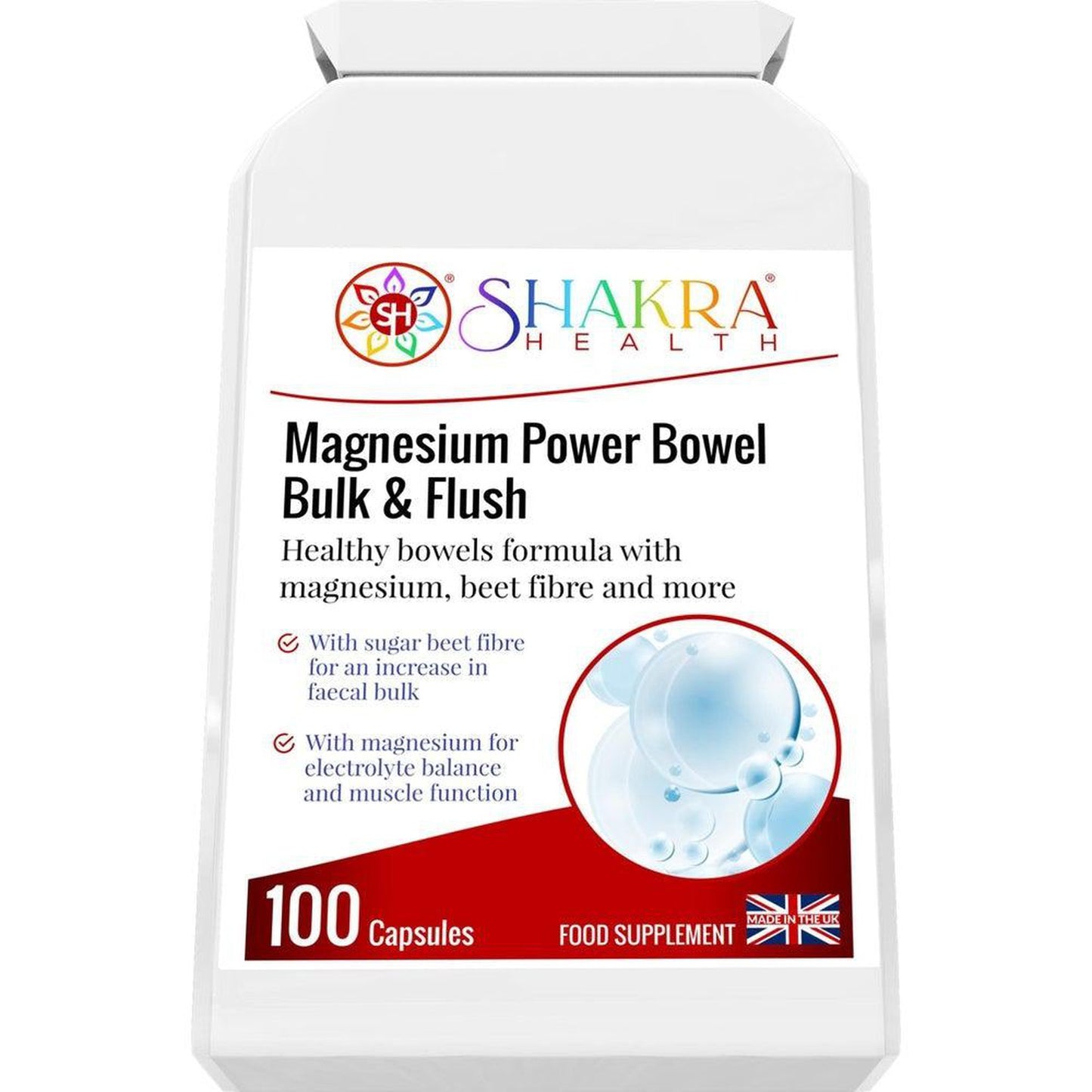












The magical mineral magnesium is essential to human life. It plays a central role in almost every bodily process and is a cofactor in more than 300 enzyme systems, making it a key player in numerous biochemical reactions in the body, including muscle and nerve function; reproduction; blood pressure regulation; DNA, RNA, and protein synthesis; and cellular energy production. We cannot survive without it, yet around 50 percent of the population has an inadequate intake, putting a considerable number of people at risk for deficiency.
Magnesium Power Bowel Bulk & Flush is a powerful, yet gentle, non-habit forming colonics formula, with nutrients specifically selected to contribute to an increase in faecal bulk and normal bowel function.
Sugar beet fibre, in particular, contributes to an increase in faecal bulk in two ways: the insoluble components of the fibre increase faecal bulk by absorbing water in the large intestine, while the soluble components are fermented by bacteria in the large intestine leading to an increase in bacterial mass. As such, this source of fibre may have a beneficial physiological effect for people who want to improve or maintain a normal bowel function.
It contains: magnesium sulphate, magnesium citrate, magnesium oxide, magnesium hydroxide, sugar beet fibre, ascorbic acid (Vitamin C), citric acid, citrus bioflavonoids, apple cider vinegar powder (a natural digestive) and fructo-oligosaccharides (FOS, a prebiotic) - ingredients designed to support the bowel hydrating actions of the magnesium, as well as digestive regularity.
Are stress and anxiety recurring themes in your life? Magnesium may be the “chill pill” you need. Magnesium plays a role in regulating the hypothalamic-pituitary-adrenal axis (HPA axis), our stress response system, and deficiencies in the mineral have been shown to induce anxiety and HPA axis dysregulation in an animal model. Indeed, anxiety is one of the physical symptoms of a magnesium deficiency. In humans, magnesium can suppress the release of the stress hormones cortisol and adrenaline and work at the blood-brain barrier to possibly prevent stress hormones from entering the brain.
The brain’s ability to change is neuroplasticity. This flexibility allows our brains to forge new neural connections (synapses) and affects learning, memory, behavior, and general cognitive function. Neuroplasticity plays a fundamental role in how well our brains age, with a loss of plasticity resulting in a loss of cognitive function. Research on neuroplasticity is growing and scientists are discovering that increasing neuronal cell magnesium levels can increase synapse density and plasticity, improving overall cognitive function. It is also showing promise to help “rewire” the brain in cases of traumatic brain injury and anxiety disorders.
As you’re probably coming to understand, magnesium is essential for healthy brain and nervous system function; this also includes attention and focus. Some of the symptoms of magnesium deficiency can manifest as irritability, restlessness, a lack of concentration, and fatigue, also symptoms associated with attention deficit hyperactivity disorder (ADHD). Studies have consistently found that children diagnosed with ADHD are deficient in magnesium and that supplementation improves behavior, impulsivity, and hyperactivity. Magnesium also interacts with gamma-aminobutyric acid (GABA) receptors, helping to maintain normal transmission of this calming neurotransmitter, while balancing levels of glutamate, an excitatory neurotransmitter.
Research shows that increasing magnesium intake may also reduce inflammation, an immune response that can contribute to a laundry list of health problems and chronic diseases, including anxiety and depression.
Magnesium plays a multitude of important roles in maintaining cardiovascular health, and many of the more severe symptoms of magnesium deficiency are cardiovascular in nature, including sudden cardiac death. Magnesium supports healthy blood pressure, reduces the risk of atherosclerosis, maintains healthy endothelial function and vasodilation, and is required for normal heart contraction and energy production in the heart.






